|
|
 |

|
Turkey,
Georgia and Azerbaijan |
 |
 |
|
|
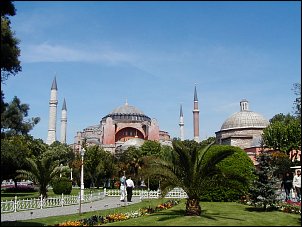 Sunday,
May 27th. Ashgabat, Turkmenistan. We're slowly but surely
progressing east. We left Istanbul on the 1st of May, heading
for Cappadocia. Our initial plan was to ride along the Black
Sea Coast, but after seeing pictures of the region around
Goreme, with its suggestively shaped rock formations, we decided
to make the detour. Ellen had found a little hotel built into
a rock, offering a so-called Honeymoon suite, complete with
a Jacuzzi, for a very reasonable price. We stayed there for
three days, wandering and driving around the region, trying
to find the best angles to take pictures of monasteries and
phallic rock outcrops. (The pics will be available soon, we're
having trouble finding fast connections).
Sunday,
May 27th. Ashgabat, Turkmenistan. We're slowly but surely
progressing east. We left Istanbul on the 1st of May, heading
for Cappadocia. Our initial plan was to ride along the Black
Sea Coast, but after seeing pictures of the region around
Goreme, with its suggestively shaped rock formations, we decided
to make the detour. Ellen had found a little hotel built into
a rock, offering a so-called Honeymoon suite, complete with
a Jacuzzi, for a very reasonable price. We stayed there for
three days, wandering and driving around the region, trying
to find the best angles to take pictures of monasteries and
phallic rock outcrops. (The pics will be available soon, we're
having trouble finding fast connections).
Attractions
in the region are many : Whirling dervishes (based in Konya
in western Turkey, the whirling dervishes are a sect that
believes in spinning around in circles as a means to spiritual
enlightenment), underground cities dating back 4,000 years,
countless monasteries and pleasant people, despite the ever
growing numbers of tourists in the region.
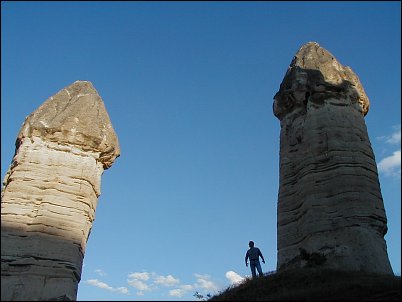 We
headed on, off the main roads, into one of Turkeys many mountain
ranges. The weather continued to be rather nasty, the roads
were very potholed and tourist presence completely ceased.
In a village called Sebinkarahisar, we spent a very pleasant
evening with a local teacher we met by chance, and a local
cook, who was informed of our arrival by the other villagers
and sent after us because he spoke German and English. He
said we were already the second tourist party this year. What
a lively place.
We
headed on, off the main roads, into one of Turkeys many mountain
ranges. The weather continued to be rather nasty, the roads
were very potholed and tourist presence completely ceased.
In a village called Sebinkarahisar, we spent a very pleasant
evening with a local teacher we met by chance, and a local
cook, who was informed of our arrival by the other villagers
and sent after us because he spoke German and English. He
said we were already the second tourist party this year. What
a lively place.
Both on
and off the main roads, stopping for gas usually lead to a
Question and Answer session accompanied by lots of tea and
good wishes. At least they let us pay for the gas. If one
measure of hospitality is the little gesture of offering tea
to passing strangers, Turkey certainly is one of the most
hospitable countries we've encountered so far. We arrived
in Trabzon, on the Black Sea, for an uneventful stay agreeably
punctuated by a somewhat strenuous (lots of walking!!) visit
to yet another monastery, Sumela, spectacularly situated high
up inside a mountain wall.
From Trabzon,
we rode into Georgia. The border crossing was fairly painless,
taking about one hour and a half, and costing $3 per person
and $10 per bike. We had been warned about corrupt border
guards and police in the region but we hardly had any trouble.
We did have to pay once, a probably bogus transit fee, and
several of the countless cops that stopped us looked like
they were really good at extorting money, but we got away
lucky. Lots of smiles and saying in the friendliest voice
possible repeatedly in Luxembourgish : "No way, meathead,
you're not getting any money" generally works.
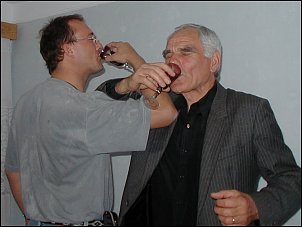 The
Georgian Black Sea coast was a favourite vacation spot for
apparatchiks during the Soviet Era, and the seaside is filled
with derelict hotels in the familiar Soviet style, or rather
absence of it. Other remnants of that legacy are huge industrial
complexes, now left to rust in the middle of otherwise beautiful
landscapes.
The
Georgian Black Sea coast was a favourite vacation spot for
apparatchiks during the Soviet Era, and the seaside is filled
with derelict hotels in the familiar Soviet style, or rather
absence of it. Other remnants of that legacy are huge industrial
complexes, now left to rust in the middle of otherwise beautiful
landscapes.
We spent
a couple of days in Kutaisi in western Georgia, where we were
introduced to the notion of Georgian hospitality by Lali and
Zouri, our hosts : While Lali tried to force us to eat every
dish she knew how to prepare, Zouri made an attempt at killing
us with kisses and homemade wine. He was very impressed with
the only Georgian word I knew: "Bolomde", which
means, "bottoms up". I had missed a great opportunity
to shut up, as for the rest of the evening, he honored my
linguistic skills by finishing his toasts (an old, honored
and very dangerous tradition in Georgia) with precisely that
invitation. Although women are theoretically exempt from having
to participate in that particular custom, Ellen ignored the
exemption and tried to help me defend the honour of all foreigners.
The following day is best erased from memory for the most
part. When we had finally mustered the courage to get up and
explore the town, we met Maher, a Syrian entrepreneur who
took p! ity on what was left of us, showed us the sights and
helped us forget our misery.
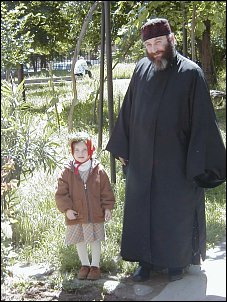 Next
stop was the capital, Tbilisi, where we indulged in the things
you can only do in capital cities in those parts, movies,
shopping, Internet and pints of Guinness. As the days progressed,
we learned more and more about Georgian wine : There are several
hundred varieties of grapes in the region, and the Georgian
word "ghvino" might very well be at the origin of
the word "wine" as we know it, since Georgia is
perhaps the oldest known wine growing region in the world.
Maybe that explains why they can drink it like water, while
unsuspecting tourists fall like flies after a meager three
litres or so.
Next
stop was the capital, Tbilisi, where we indulged in the things
you can only do in capital cities in those parts, movies,
shopping, Internet and pints of Guinness. As the days progressed,
we learned more and more about Georgian wine : There are several
hundred varieties of grapes in the region, and the Georgian
word "ghvino" might very well be at the origin of
the word "wine" as we know it, since Georgia is
perhaps the oldest known wine growing region in the world.
Maybe that explains why they can drink it like water, while
unsuspecting tourists fall like flies after a meager three
litres or so.
After
a final two days in Telavi, capital of the Kakheti region,
and a visit to the Tsinandali winery, we rode on into Azerbaijan.
Although Azerbaijan is said to be poorer than Georgia, the
country seemed somehow more progressive, more looking to the
future rather than the past. Villages and cities were less
in a state of disrepair than in Georgia, smiles were offered
more readily and the mood appeared more optimistic. After
a pleasantly easy (and free!!) border crossing, we stopped
in Sheki, site of a palace and an old Karavanserai converted
into a hotel. Water and electricity supply tended to be erratic,
but the views were great, and at the Khan's palace, we had
to pose for scores of pictures with a group of Azeri students
that seemed to like our biker outfits.
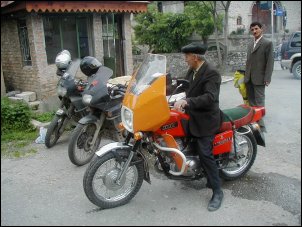 The
following day, as we headed towards Baku, we met Knut Kaspersen,
a Norwegian working in Baku, who promptly offered his assistance,
organized free accommodation and generally was to make the
following days a very pleasant experience. We joined him and
his jolly group for a visit of a remote mountain village,
before taking up our new quarters in Baku, a very lively town
with some great architecture, good restaurants and helpful
people. Since we had a five-day transit visa, we only stayed
for three days, although we were sorely tempted to extend
our stay, if only to sample more of the excellent and cheap
Azeri caviar. Next time, once again.
The
following day, as we headed towards Baku, we met Knut Kaspersen,
a Norwegian working in Baku, who promptly offered his assistance,
organized free accommodation and generally was to make the
following days a very pleasant experience. We joined him and
his jolly group for a visit of a remote mountain village,
before taking up our new quarters in Baku, a very lively town
with some great architecture, good restaurants and helpful
people. Since we had a five-day transit visa, we only stayed
for three days, although we were sorely tempted to extend
our stay, if only to sample more of the excellent and cheap
Azeri caviar. Next time, once again.
Getting
on the ferry to Turkmenistan proved to be quite an adventure,
but could be solved with Knut's help, and by haggling furiously
(Initial asking price for us and the bikes: $400, reduced
to $240 after an hour's discussion). The stories we had heard
about the ferry and Azeri customs were not encouraging: From
multiple bribes to "the worst ferry in the world"
to stories about the captain refusing to let passengers off
the ship without further payments, we had heard enough to
approach the experience with caution. Lucky again: Azeri customs
were the best so far, not only did nobody ask for bribes,
but the customs officials actually presented us with a CD
and an Azeri flag as a gift. The ferry was similarly uneventful:
We were the only passengers aboard and other than a small
payment to upgrade our cabins, it was all quite pleasant.
In the
next chapter of our ongoing events coverage, we will tell
the tale of how the Marquis de Sade was instrumental in designing
Turkmen customs procedures, how to herd camels by motorcycle,
and reveal the identity of the world's greatest megalomaniac.